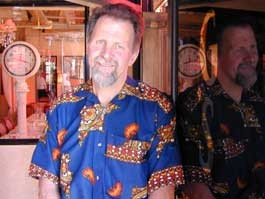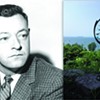Published May 15, 2002 at 4:00 a.m.
Anyone thinking of opening a restaurant ought to study Robert Fuller’s customer comment cards. Nearly all his secrets to success are right there in plain language — a postcard-sized business philosophy — and you don’t even have to read between the lines. Queries about the greeting, the service, the food and the overall experience are standard fare at dining establishments that bother to ask, but Fuller’s emphasis — “We want to be sure you enjoy your experience… We personally review all of these comment cards” — seems especially heartfelt.
“I got into the restaurant business thinking it was all about food, but it’s really about people, the relationships between the customers and the staff,” he says, “and I find it infinitely fascinating.”
Fascinating enough, that is, to keep the courses coming. At a time when several successful Vermont restaurateurs are stepping out with second establishments, 55-year-old Fuller — a former chef who graduated from the prestigious Culinary Institute of America — has already built something of an eatery empire in Vermont. He owns Leunig’s Bistro in Burlington, Pauline’s in South Burlington and the brand-new Bobcat Café in Bristol, and is co-proprietor of two others: Gillian’s in Shelburne and Cubbers, also in Bristol.
Each is unique in ambiance and cuisine, but the focus is always the same — “to provide our guests with a high-quality, restorative dining experience.” The efficacy of this seemingly straightforward mission can be measured in the restaurants’ volume of business — especially repeat diners. Fuller says revenues have doubled in the five years he’s owned Leunig’s.
Thoughtful and philosophical, Fuller digresses when he talks; he’s fond of the vividly told story and illustrating his points with analogies. He likens the restaurant business to a theatrical performance: “When the door opens, you have to be in character and know your lines. The lighting has to be right, everything has to be right.” The star billing? “All the money comes from the customers,” he emphasizes. “They need to be the center of everything.”
And you thought you were just going out to eat.
When he talks about his staff in his imperturbable, measured way, Fuller sounds more like a mediation expert — and sometimes a coach — than a restaurateur. “There’s a lot of cryptic, incomplete communication in the world, and it’s endemic in a busy restaurant,” he says. “People’s feelings get hurt, tensions build. That’s when I get involved — I get people to speak in complete sentences. I’m a communication facilitator.”
Fuller declares with some pride that he treats his employees better than any bosses in the food biz ever treated him. “The number-one reason people stay at a job is job satisfaction — number two is money,” he notes. “I try to create an environment where people feel appreciated.” Medical benefits, holiday bonuses and a profit-sharing retirement plan for core employees surely help, but so does positive reinforcement. “Catch people doing something right,” Fuller advises. “Catch them succeeding.”
Few employees are in a better position to evaluate Fuller’s M.O. than Robert Conlon, a longtime bartender and now dining-room manager at Leunig’s. “I’ve worked in the restaurant business since 1965, and Robert Fuller is the first restaurant owner who I’ve never heard shout,” Conlon remarks wryly. “He’s always calm and takes the long view… he’s also very good at compliments and saying what’s good, as well as saying what’s not working.”
The middle of three children, Fuller grew up on a dairy farm in Ludlow, Massachusetts. Although he remembers only the bucolic bliss of that time — including a Polish couple across the road who farmed with horses — Fuller says he tends to let go of or simply forget bad times. His first cooking success came out of a Duncan Hines cake mix box.
But it wasn’t rural romanticism that brought Fuller to Vermont in 1976. A little bit of post-culinary-school travel, including a stint out West, taught him that “you can reinvent yourself elsewhere. I had to leave my hometown to become the person I wanted to be.”
Fuller moved to Middlebury for a chef job at Mr. Up’s Restaurant when he was 29. After six years there, he began looking for a business opportunity of his own, and found Pauline’s. With financing from founder-chef Pauline Hersh-enson, Fuller and his wife bought the Shelburne Road eatery in 1982 and “worked like dogs,” he says, not taking a paycheck for the first three years — never mind a vacation.
The hard work paid off. In 1986, Fuller bought Déjà Vu in Burlington. “We had some success initially there,” he says of the beautiful, artisan-crafted Pearl Street establishment. “But the economy slipped, and I slipped into divorce.”
In this same period, Fuller nearly slipped away altogether. While crossing some railroad tracks on a bicycle near his New Haven home, a mishap sent him flying over the handlebars and onto his head — without a helmet. He has little memory of the accident, the surgery that relieved a dangerous subdural hemotoma in his brain, or the 10 days in Burlington’s medical center. (Fuller’s father died of a similar injury as the result of a motorcycle accident when his son was 12.)
Instead Fuller focuses on his complete, and near-miraculous, recovery. But the brush with death seems to contribute to his enduring attitude — a combination of the ’60s chill-out platitude Be Here Now and the more pragmatic Latin classic, carpe diem.
Perhaps this new embrace of life helped Fuller take some big steps over the following decade. In 1992, he sold Déjà Vu to the Thai restaurateurs who reopened it as Parima. Just days after his divorce was final that same year, he met Allison Parker, a nurse practitioner. When the couple married three years later, Fuller moved to her house in Lincoln and adopted nearby Bristol as his new hometown.
“The only reason I’m at Leunig’s is because I went to Africa,” Fuller announces. In 1997, he carved out time from Pauline’s so that he and Allison could accompany a Bristol-based cultural group on a month-long trip to Ghana. He returned to find that everything was running smoothly at the restaurant without him. So when he learned that Leunig’s was for sale a short time afterwards, Fuller went for it. “If I’d had my head stuck in a stock pot at Pauline’s,” he says, “I wouldn’t have done that.”
Other serendipitous opportunities led Fuller to take over the Bristol pizzeria Cubbers in 1998, with ex-employee Drew Smith, and to transform the Shelburne Bake Shop into Gillian’s Restaurant two years ago with partner and chef Michael Weiner.
Fuller’s latest venture is just across the street from Cubbers. If restaurants are his children, he suggests, The Bobcat is “the first time I’ve conceived — I have always adopted.” Fuller had been involved in the restoration of the downtown Dunshee Block. Fuller and a partner bought the former bank building, and he agreed to create a restaurant — but not before some very creative financing had been worked out.
“I talked to a bunch of people and decided I’d need at least 12 to invest $5000 each,” Fuller says of the café’s communal-investor plan. Without that “vote of confidence,” Fuller says, “the idea wasn’t worth it.” He ended up with twice that many — an indication locals were starved for “a medium-priced restaurant for grown-ups,” as he puts it. “People want to see positive things happen in these small towns,” he adds. “I thought, ‘I’m a restaurateur, I can do this for the community.’”
In turn, the investors — who get a deal on dining — make for a loyal, regular and uniquely engaged customer base. Though Fuller is The Bobcat’s owner, former Leunig’s sous chef Andy Saver handles the cooking, and brewing partners Paul Saylor and Rob Downey will manage the on-site brewing operation — not yet up-and-running in the six-week-old eatery. Saylor and Downey, partners in Wind Harvest Brewing, also have projects in the works with American Flatbread in Middlebury and Burlington, and a “closed-loop brewing system” in Burlington’s Intervale.
Typically, though, Fuller picks his partners from his ever-growing pool of employees. “You know each other,” he says of the strategy. “You have some basic knowledge of who does what and how they perform, so you can kind of direct them into an area of the business where they will be strong, as opposed to asking someone with no bookkeeping experience to manage the payroll. You have to be smart enough to know what you can’t do.”
At The Bobcat, diners can at least get the feeling of a pub — minus the smoke — as only a windowpaned wall separates customers’ tables from the gleaming brew tanks. A long, century-old hardwood bar from Port Henry, New York, extends down one side of the rectangular room; the rest is filled with a banquette and small-table seating, overseen by framed portraits and stuffed versions of the café’s namesake. Though the walls are painted golden yellow, the dark wood and 19th-century architectural features give the place an Old World-meets-New England coziness.
But there’s nothing old, or publike, about the eclectic cuisine, which Saver calls “contemporary American comfort food.” And the pleasant buzz of a dinner rush one recent evening suggests Bristol is taking to its new restaurant for grown-ups. “Robert really knows what he’s doing,” applauds Saver.
Fuller is surprisingly philosophy-free in his approach to food. Other than a personal penchant for wild, foraged edibles — “leeks are in season right now,” he informs — and his Western European culinary training, he offers only: “Food has to be satisfying, to me and to my customers.” That’s not to say Fluff sandwiches are likely to end up on the menu at Leunig’s, but Fuller does pay attention to what people want.
This restaurateur favors the European dining experience, with its commitment to fresh foods and ambiance. “My role model is André Soltner, a chef at Lutèce in Manhattan for 30 years,” Fuller says. “He was humble in front of his ingredients. He said, ‘How can I possibly improve on a carrot?’”
Pretty much everything that can be done with food has been done, as far as Fuller is concerned, “so a lot of what goes on with food is fashion.” That said, the menus are intentionally different at his five restaurants, and he gives his chefs free rein. “I’m growing and have other job descriptions now,” he says.
In fact, “growing” as a person pretty much sums up Robert Fuller’s personal mission statement. Ironically, he spent much of his earlier life trying to get physically smaller — in girth. At 6-foot-4, Fuller now weighs in at a reasonable 215 pounds. When he went to culinary school, he was 100 pounds heavier, the stereotypic rotund chef. “I always wanted to be ‘normal,’” Fuller says without self-pity, “but it took me a long time to figure out how to eat normally.”
While still in school, he launched into a most difficult weight-loss program — fasting — and lost about 80 pounds in a year. Ensuing years brought on the “roller coaster” of gain and loss experienced by most dieters. He’s not the first to observe that “psychologically, food becomes a friend.” It wasn’t until he was going through his divorce in the early ’90s, Fuller confides, that he “learned about fats.” He went from eating pounds of cheese to weaning himself of all high-fat foods. He says it took only two weeks to lose the craving.
Fuller has maintained a normal weight for years, and credits his wife with introducing him to a more active lifestyle, which includes biking, skiing and kayaking. Fatty foods, such as ice cream — his favorite — are restricted, rare treats. “The biggest problem with dieting is obsessing about it,” he says. “All I want to be is normal; I don’t have to be perfect.”
Fuller’s personal relationship with food may factor into the mostly healthful menus at his restaurants — though none of them are stingy with fats or flavors. At home he prefers simple pasta and sautéed vegetables, grilled fish or chicken “and a good red wine.” That diet may be harder to stick to when he takes his wife to Europe this summer, to celebrate Allison’s new master’s degree and the couple’s seventh wedding anniversary.
With a happy marriage and five functional “children,” Fuller seems the picture of contentment. “I have an embarrassment of riches,” he offers. “If you just stop and realize that, everything is so much easier.” What could be better? “We have a Peace Corps fantasy,” he reveals. “In three years we’re supposed to apply . . . and live in a different culture. I’m interested in trying to help people with business stuff and possibly some environmental things. I would always be interested in food, certainly, and how people are preparing the food they have. Maybe I’d help people take their cooking skills and figure out a way to make money at it. I guess that’s a restaurant. . .”
More By This Author
About the Artist

Matthew Thorsen
Bio:
Matthew Thorsen was a photographer for Seven Days 1995-2018. Read all about his life and work here.
Matthew Thorsen was a photographer for Seven Days 1995-2018. Read all about his life and work here.
Speaking of Bobcat Cafe, bristol
-

Smoke and Lola’s Opens for Breakfast, Lunch and Free Soup in Bristol
Dec 12, 2023 -

A Spate of Rural Homicides Puts Residents of Small Vermont Towns on Edge
Nov 1, 2023 -

Three Questions for La Chapina’s Wendy Girón Ahead of Her Bristol Pop-Up Dinner
Oct 31, 2023 -

Wish I Were Here: The Vermont Summer Bucket List
Aug 2, 2023 -

Bristol’s Farmers Market Is Back on Monday Nights
Jun 6, 2023 - More »
Comments
Showing 1-1 of 1
Comments are closed.
From 2014-2020, Seven Days allowed readers to comment on all stories posted on our website. While we've appreciated the suggestions and insights, right now Seven Days is prioritizing our core mission — producing high-quality, responsible local journalism — over moderating online debates between readers.
To criticize, correct or praise our reporting, please send us a letter to the editor or send us a tip. We’ll check it out and report the results.
Online comments may return when we have better tech tools for managing them. Thanks for reading.














































